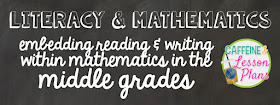Hi, everyone! Mandy from Caffeine and Lesson Plans here to talk to you about writing in mathematics. It's something that has been on my mind a lot lately, as my district has designated writing as the focus of our instruction for this school year. So many teachers automatically began to focus on narrative writing, but I thought I'd apply it to my teaching in other ways, too- namely, in mathematics!
I have to tell you, math has a special place in my heart. In addition to my generalist teaching license, I hold a math specialist license. I think that people tend to give themselves permission to be afraid of math in a way that they do not in other subjects. I've heard parents dismiss a student's bad grade by saying "oh, well, I was never good at math either. Maybe he doesn't have a math brain" I've never heard a parent say the same about another subject though. No one dismisses poor reading with "well, maybe he doesn't having a reading brain." All the parents I have worked with have done everything possible to help their child overcome their reading difficulties, and when all else fails they have had them tested for learning disabilities. So, why the difference in math? I think it all comes down to how students are taught. Allowing students to apply the academic skills that they are good at and enjoy using will help them to deepen their mathematical knowledge. Sounds easier than it is, right? I totally agree- and there are a million ways to incorporate literacy and mathematics! They don't all work for the middle grades, either. So- here are my quick tips.
Math Literature
Invest in some quality mathematical literature. It's expensive, but there are ways to get some reasonably priced books. I visit my local used bookstore, go to library book sales, and hit up yard sales. I also order them from half.com and check the used prices on amazon.com. When all else fails, I use my scholastic book points to order them. My math library is well stocked- I have something for everyone! I have created task cards to go with each math literature book, and have my students read them during one station of guided math. It's a win for everyone. My students that are avid readers can't wait for the opportunity to read some more, and my struggling readers get the opportunity to practice their reading some more. More than that, teaching mathematics through literature makes a stronger connection to the material. The students see it is a something that is learned organically, much like the morals or lessons that they learn from other stories that they read.
Creative Writing
I mentioned earlier that my focus on writing this year has tied into my mathematics instruction. So far, it has really worked. Each morning as my "do now" activity I give my students an equation that relates to what we learned the previous day. Their job is to write the story of the problem. They write a word problem that ranges between a few sentences and a paragraph. I have seen some seriously creative writing come out of this! More than that, their stories have given me some really good insight into their mathematical understanding. Do they know the key words that indicate operations? Do they correctly describe which operation to use within their story? Do they understand how to indicate what each number represents? I feel as though I have been able to learn more about what the students actually understand by reading their stories than by checking their computations on word problems I provided.
Expository Writing
Some of my students really need to talk about their learning to help build permanent knowledge. Usually, this isn't a problem in my classroom as we work in small groups and talk frequently throughout the lesson. Sometimes, though, we just don't have enough time to talk as much as I would like. So, I ask my students to "talk it out" in writing like they would with a partner. I often have them write a letter to another student explaining how a particular mathematical concept works- for instance, how to create equivalent fractions. I always ask them to pretend the person they are writing to has no mathematical knowledge so they explain everything. The act of putting the words on paper makes deep connections that some students need.
So, that's it- how I incorporate literacy and mathematics instruction in my classroom. I'd love to hear what's worked for you, too!


Good post. I respect you that you are very concerned with your subject. Mathematics is truely a good subject but need more attention. So try this again and again and with practice you can be good in it.
ReplyDeleteA lot of languages have been developed by the personals to talk secretly and explore more int he world and these languages are being used to teach the studetns in a new perspective.
ReplyDeleteSchool life is one of the best part of life. I'm also a school student. When I explore this site I know what I'm reading. It's so emotional. I know that I'm also facing this problem too. So sad moment for all.
ReplyDeleteInteresting post. Students are taking interst in mathematiics so now we need to plan writing mathematics planning. It entirely depends on how we follow http://www.letterofrecommendation.biz/business-letter-of-recommendation-professional-help/ and how does it execute.
ReplyDeleteI just repect your opinion which seems so perefct. Writing in mathematics can be challenging but yes you can definitely do this. I can also learn from http://www.statementofpurposemba.net/online-mba-gmat-waiver-letter-help/ about how it would be work. So keep it up man!!
ReplyDelete